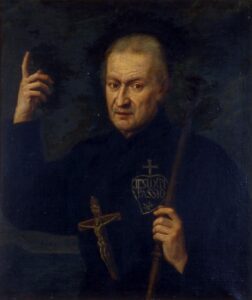Today is the feast of St Paul of the Cross, the founder of the Passionist order. He lived in the 1700’s, and is known as a great missionary and mystic. But he is also known as one of the great penitential saints. Like many saints across the ages, he engaged in intense physical mortification. He rolled naked in thorns, slept on the floor and used a rock for a pillow. On one occasion he scourged himself so harshly that he fainted from the pain.
Here is an excerpt from a biography of the saint written by Fr Edmund Burke C.P., an Irish Passionist priest. It describes St Paul’s habit of scourging himself in public during the missions he gave…
For the greater part of his missionary career, Paul thus publicly scourged himself on the mission platform almost every day. Nor was this a mere formality: it was an unambiguous penance. There was a dramatic scene at the canonisation process when a priest witness showed the President a scar still visible on his hand, the result of an accidental stroke that he had received when he tried to restrain the saint and to take the discipline from him. Another well-authenticated incident occurred in the public square at Santa Fiora. Part of the discipline broke off under the force of his repeated blows and flew through the air to alight upon the high roof of a neighbouring house. As if this penance was not sufficient, the saint sometimes preached – either on the Passion or on Hell – with a crown of thorns on his brow. He forced this down upon his head during the sermon, until blood could be seen tricking down his temples.
It’s worth noting that St Paul of the Cross was not the only saint to perform such extreme acts in public missions at this time…
St Paul of the Cross is a great and popular saint. Yet he was also extraordinary severe with himself, perhaps sometimes imprudently so. Yet his severity, and that of many other saints, has not disqualified them from canonisation. It has not turned people away from them. The actions of these saints needs to be seen in the context of their time – people were really tougher in the past, and such intense penance was much more the norm in the Church at that time. Whether we think this was a good thing or not is really irrelevant – it is a fact.
The penances of the saints have to be seen in the context of their spiritual lives. They ardently loved God, and they sought an outlet for that love, and sometimes that outlet was through suffering and pain. Those of us who just plod along may not understand that, just as the “couch potato” doesn’t understand what would drive somebody to compete in an Ironman competition or to run a marathon. Sometimes those who are at a different stage of development – spiritual or physical – find it hard to appreciate the actions of those who are more advanced.
Fr Doyle’s penances were always private. We would know NOTHING of them if he had not recorded them in private diaries and if the decision had not been taken to publish his notes after his death contrary to his own express request. Fr Doyle was a happy, joyful and healthy soul who always advised others to take on very small and little penances. On one occasion he advised somebody to take on the littlest penance she could find, so long as it was done with love. For Fr Doyle, these little penances often revolved around doing one’s daily duty with fidelity and perfection.
Everything Fr Doyle did has a precedent in the lives of the saints, and in truth it was mild compared to many of them. It is in this context that his penances should be judged.

